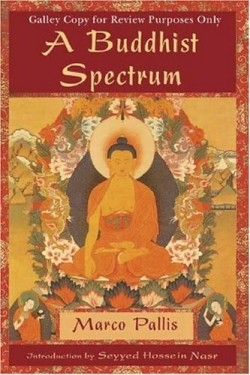A Buddhist Spectrum
Contributions to Buddhist-Christian Dialogue
All of the world’s major religions teach the concepts of kindness, acceptance, tolerance, love, peace, and harmony. The ten essays in this collection come from questions posed to the author during his lifetime of working with comparative religious studies. Some of the pieces were composed as lectures for predominantly Christian audiences; others were written with the Buddhist viewpoint in mind. The book represents more than half a century of “the study of and the actual experience of Tibetan Buddhism as well as the deeply sympathetic study of other religions.”
Pallis (who died in 1990) first encountered Tibetan Buddhism while climbing the Himalayan Peaks in the 1920s. Born of Greek parents who lived in Liverpool, England, he received his education at Harrow and Liverpool University and served in the British Army during “The Great War.” A lover of nature, a student of religion, an accomplished musician with specialties in Renaissance English music, and a mountain climber, Pallis was one of the first to bring his knowledge of Tibetan Buddhism to Christians and to address the concerns in Christian circles regarding Buddhism. The author also refers to Hinduism and Islam, offering “a multiplicity” of religious ideas.
In his attempts to answer questions about the differences and similarities among faiths, Pallis addresses: Living One’s Karma, The Marriage of Wisdom and Method, Is There A Problem of Evil?, Is There Room for “Grace” in Buddhism?, Considerations on the Tantric Alchemy, Nembutsu as Remembrance, Dharma and the Dharmas, the Metaphysics of Musical Polyphony, Anatta and Archetypes as Seen Through Buddhist Eyes. Because of the nature of the book, there are some redundancies, but the overall effect is one of meditation, despite the book’s sexist language (i.e., using “man” for “humanity”), which dates the collection and distracts the reader.
The essay called “Living One’s Karma” offers one of the better examples of the comparisons and contrasts between Christian and Buddhist tenets. Discussing self-identification, the identification of good karma, and karma as a determinant of one’s vocation or specific dharma, the author interprets Buddhist beliefs using biblical scriptures.
During his lifetime, Pallis was widely respected as a teacher, musician, composer, and translator of Traditionalist works. For many years, he corresponded with Ananda Coomaraswamy, Rene Guenon, and Frithjof Schuon. Many of the essays included here were first published in the British journal, Studies in Comparative Religion. Pallis’s 1939 book, Peaks and Lamas, was a bestseller; The Way and the Mountain, published in 1960, is scheduled for republication.
Disclosure: This article is not an endorsement, but a review. The publisher of this book provided free copies of the book to have their book reviewed by a professional reviewer. No fee was paid by the publisher for this review. Foreword Reviews only recommends books that we love. Foreword Magazine, Inc. is disclosing this in accordance with the Federal Trade Commission’s 16 CFR, Part 255.

